
Amanda Satterthwaite ’10 is a physician in New Orleans, Lousiana.
I’m not the kind of person who would ever join the military. My younger cousin joined the Marines some months back, and I remember telling her to avoid going to war at all costs. Ha! Look at me now.
I’m in New Orleans and just finished a two-week rotation in one of the busiest VA hospitals in the nation. I remember my brother texting in late March, as the number of COVID patients was surging, to ask how I was doing. There wasn’t anything I could have texted back in that moment to accurately describe the hidden panic, fear, but forced calm I was feeling at that time.
Instead, I decided to describe the situation. The once-sleepy ICU is now busy, at capacity, and we are boarding patients on ventilators in the emergency department. We’ve had to recruit residents from other services to help with the number of admissions. Almost all of the patients in the unit have COVID-19; they’re intubated and are being chemically paralyzed and kept prone. I see few patients improving. I am now having to reuse my face shield and am having trouble finding surgical masks to cover my N95 mask. I started tearing up (secretly) in my patient’s room in a panic when I was disrobing my PPE and didn’t know in which step to take off my face shield after the daily change in procedures and plans. I fought to ward off a panic attack when three rapid responses were called with only three ventilators left. My colleagues and I can only look at each other and say, “It’s happening.”
Being an internist and psychiatrist doesn’t help the situation. I’ve experienced the paranoia, insomnia, and increased worry. The day after I heard that a decreasing sense of taste and smell may be initial symptoms of COVID, my tongue started to feel numb. The numbness was real. Oh, the power of the mind! I know that I am not alone.
I’ve always grappled with my identity as a physician. Let’s be honest; I had dreams of becoming a rap star in my youth. I’ve never made “physician” my entire identity, and now, we are being called “heroes on the front line.” I wish I felt more heroic than I do now. I wish I felt like I were saving lives instead of supporting organ systems until I can’t support them anymore.
I do have this new sense of responsibility to stop being the transparent and rash communicator I was in the past and to give friends and family the details they want to know from “the front line” while providing them with a sense of calm, hope, and control.
I’m 32. My birthday was last week, and instead of taking my usual birthday-extravaganza trip, I took a trip to the ICU to work during the biggest health-care crisis most of us have ever known or could imagine. I knew I would grow up one day. Thanks, COVID.
PAW reached out to alumni who are on the front lines of the COVID-19 crisis or are affected by it in different ways. Read their essays here. More will appear in our next two issues and online over the next few weeks. Write to us at paw@princeton.edu with your own story.
